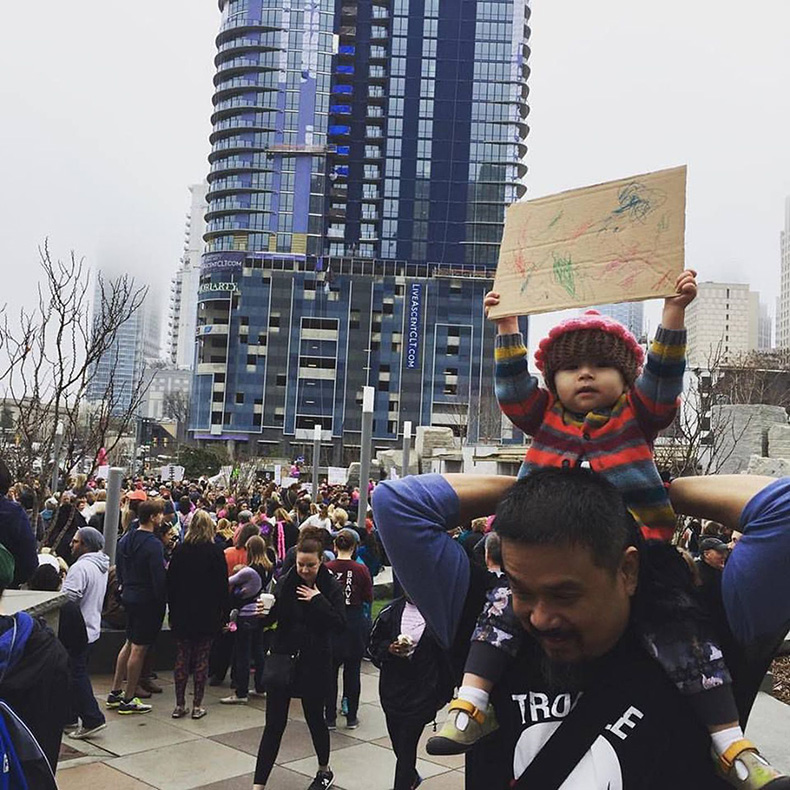
1. The Fleetwoods, “Unchained Melody” in Things to Come (L’Avenir), written and directed by Mia Hansen-Løve (Arte France Cinéma) At the very end, after Isabelle Huppert’s philosophy professor has been abandoned by her husband for another woman, dropped by her publisher, and left stranded by her mother’s death, this song comes on, less to bless than seal a scene of bourgeois family life—and, so modestly put across by the Fleetwoods’ Gretchen Christopher and Barbara Ellis, whose precise singing is a kind of signal to let you feel how much the song is taking them out of themselves, into a preternatural clarity that makes the sound of the recording feel so deep that you can get the sense that the song is not merely bigger than the singers but bigger than life. Was it a trick of the sound designer, a remix that brought out something that was never there before? I know the Fleetwoods—it was as if I’d never heard this, from 1959, what one could have taken as a filler track on their first album, a standard with nothing more to say. Here it’s a cloud, with the voices of the two women in the group floating over the tired, all but instantly clichéd words of the song, so that the song is abstracted from itself—and so fully that you might not even recognize this most familiar of familiar songs, and though it sounds like the Fleetwoods, it seems impossible that it is.
2. Lithics, Borrowed Floors (Water Wing) When I first heard this 10-song LP I thought it was a throwback of truly alarming scholasticism: I was sure I was listening to a retrieval of a 1979 Leeds band in the Gang of Four/Delta 5 circle that for no good reason—because there wasn’t a moment that wasn’t hard and brittle at the same time—no one ever noticed until someone dug these tapes out of a basement. All the signs were there: strict and angular rhythms, all instruments but the bass lead dropping out as if someone had turned off the power and then flicked it back on, a harsh, flat, determined lead singer who communicated resistance to both her band members and whoever might be listening.
It was so odd I kept going back to it, and very quickly any sense of the past dropped away. These are four young people from Portland—though you can imagine that it’s in keeping with the anarchist anonymity of the Leeds contingent that, while there are pictures of four people here, there are no band members’ names here or on their Bandcamp site—who are interested in tension. They make it, they dramatize it, they play with it, they don’t question it. That gives their songs a sense of contingency, accident, catch-it-while-you-can: even when the singer seems to dive into a freer pulse, as on “Thing in Your Eye” (put that in the punk-title hall of fame) you might be wondering—you can feel the group wondering—how long it can last, and when the singer goes back to bits and pieces on the next song, “Human Doctor” (something, apparently, you can no longer take for granted), it’s thrilling, because you’re learning their language and you really don’t want them stop speaking it.
In the musically open spaces of their dynamics as a band they create an atmosphere of tremendous emotional density: though the album barely covers 20 minutes it seems to last twice as long. When you’ve finished it you’ve been somewhere.
Lithics: "Thing in Your Eye" (via Bandcamp)
3. On a Women’s March (January 21) From the time of the first protest marches in which I ever took part—there were those in 1964 and 1965 that were peaceful, and for the next years those that weren’t peaceful, or safe—seeing babies and little children wearing political hats or T-shirts, professing an allegiance they couldn’t possibly understand, always bothered me. It wasn’t an affirmation of a collective good. It was a denial that the child had a self and an affirmation that the child could be used as a prop. A picture that circulated on social media last month shows something different: a small person holding up his or her own statement, in his or her own language, in the street, for everyone to see, as a public citizen, saying, “I’m here.”

4. Cecily Marcus writes in on January 21: “On a cold, grey, wet, miserable day, the first day, the day I should have been in St. Paul or Oakland or Washington, D.C. or Berlin, I was at the butcher shop in Minneapolis. In a place owned and operated by people like me—white people in their 40s—I hear quiet, deliberate guitar chords going down the scale. I tell my 6-year-old that this is a good song. Sleater Kinney’s ‘Modern Girl,’ the darkest picture of a sunny day ever. Two good songs, with Bikini Kill’s ‘Rebel Girl’ coming right after: I tell the only woman working there that I never hear this kind of music in public, not even on the radio. She tells me that she thought that the men working with her—for her?—needed to hear it today. On a day when what you hear and what you say in public feels more important than ever, this was a small, momentary sigh of relief. And then it was gone.”
5. Charles Lloyd and the Marvels with Lucinda Williams, “Masters of War,” on I Long to See You (Blue Note) From the jazz saxophonist Lloyd, riffs that wouldn’t disturb a car commercial. From Williams, a performance in which sententiousness is made into the master of all values.
6. From an academic conference at Yale: We’re used to Donald Trump punctuating his pronouncements with a quick “OK?” as if to simultaneously block any disagreement and reassure himself that he’s right. There’s a match in the habit of self-consciously hip younger academics presenting papers at a conference, reflexively hitting “right” at the end of declarative sentences, but in a manner that makes you hear a comma, not a question mark: a way of certifying the assumption that everyone present shares a certain set of opinions and terms of discourse. Right—it’s not an aggressive pronouncement but a congratulation of both the speaker and the audience for the truth that they already agree and that no fundamental preconceptions will be challenged. In other words, they and Trump are speaking the same language.
7. Lindsey Lee Johnson, The Most Dangerous Place on Earth (Random House) In this novel set in a high school in Mill Valley, a moment to remember: “You fucked one teacher. That doesn’t make you an adult.”
8. Frame of reference in undergraduate class at Berkeley (January 19) About 80 students, mostly freshmen and sophomores: asked if they knew who Bob Dylan was, almost everyone raised a hand. With The Great Gatsby still a staple of high-school English (a lynchpin in The Most Dangerous Place on Earth, as it happens), the same for F. Scott Fitzgerald, and close to that for F.D.R. Robert Johnson, very few hands—more for James Dean, but still less than a third of the class. Only a handful knew the John Henry song or story, but well over two-thirds said yes to Tupac Shakur and more to Amy Winehouse. More people than not had seen The Godfather, and perhaps as a sign that the ground for the apocalypse has not been laid as firmly as some might hope, almost no one had heard of Ayn Rand.
9. Levon & the Hawks, Live at Crang Plaza in Ontario 1964 (YouTube) “When Rick Danko and Richard Manuel sang ‘Bring It on Home to Me,’” Robbie Robertson writes in Testimony, “the sun came out,” and even through the awful, foggy sound, you can hear that happen.
10. Y Pants, Y Pants (Water Wing 12" 45) Barbara Ess, Verge Piersol, and Gail Vachon fooled around with toy-store instruments in the downtown arts milieu in New York in the late 1970s and early ’80s, and they never sounded like they weren’t having a wonderful time. If their best record is still a snakepit version of Lesley Gore’s “That’s the Way Boys Are”—it could be women out of some girls-in-prison pulp novel screaming about rape by their guards—everything they did felt just a step away from ordinary life and nothing they did felt obvious. The six numbers here—from 1980 sessions not included on the 1982 Neutral album Beat It Down—catch their whole narrow, quivering range. In “Favorite Sweater” the mere fact of Pierson singing about something everyone has and nobody thinks very much about is pleasurable, and when Vachon and Ess come in behind her the fact that they all believe something momentous depends on it is even more so. When Mick Jagger sang “Off the Hook” on the Rolling Stones’ second album, when they were just beginning to write songs, he was irritated, then he was bored. When Y Pants cover it 15 years later they do what anyone would do: they go through every good and bad reason someone’s not answering, from having forgotten to hang up the phone when phones still hung up to being dead.
Y Pants: "Off the Hook" (Buy on Bandcamp)
With thanks to Emily Marcus.








